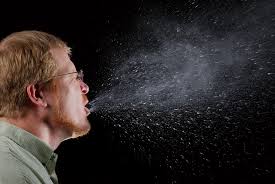sneeze

vi. 打喷嚏
n. 喷嚏
n.
喷嚏;喷嚏声;
vi.
打喷嚏;
变形
过去式:sneezed过去分词:sneezed现在分词:sneezing第三人称单数:sneezes
双语释义
n.(名词)[C] 喷嚏 sudden,uncontrollable outburst of air through the nose and mouth
v.(动词)vi. 打喷嚏 make a sneeze
英英释义
sneeze[ sni:z ]
n.a symptom consisting of the involuntary expulsion of air from the nose
同义词:sneezingsternutation
v.exhale spasmodically, as when an irritant entered one's nose
"Pepper makes me sneeze"
双语例句
用作名词(n.)
A baby's sneeze is not very loud.
婴儿的喷嚏不太响。
She let out a loud sneeze.
她打了一个很响的喷嚏。
用作不及物动词(vi.)
The dust made him sneeze.
灰尘使他打了个喷嚏。
The pepper in the food caused me to sneeze.
这食物中的胡椒味儿呛得我直打喷嚏。
I caught a cold and sneezed a lot.
我得了感冒,老是打喷嚏。
权威例句
Sneeze reflex: facts and fiction.Anti-bacterial sneeze spray
Sneeze-evoking region within the brainstem.
Nasonasal reflexes, the nasal cycle, and sneeze
Role of noradrenergic pathways in sneeze-induced urethral continence reflex in rats.
Viral purging of haematological autografts: should we sneeze on the graft?
Role of spinal serotonergic pathways in sneeze-induced urethral continence reflex in rats
Urethral closure mechanisms under sneeze-induced stress condition in rats: a new animal model for evaluation of stress urinary incon...
C-Fos-like immunoreactivity in the cat brainstem evoked by sneeze-inducing air puff stimulation of the nasal mucosa
Functional analysis of active urethral closure mechanisms under sneeze induced stress condition in a rat model of birth trauma
sneeze
sneeze: [15] The Old English word for ‘sneeze’ was fnēsan, a distant relative of Greek pneuma ‘breath’ (source of English pneumatic). This survived into Middle English as fnese. The letters f and s were very similar in medieval script, so it could have played a part in the late 15th-century emergence of sneeze. Fnese had largely died out by the early 15th century, and it could well be that when printing got into full swing in the 1490s, with many old manuscript texts being reissued in printed form, printers unfamiliar with the old word fnese assumed it had the much more common initial consonant cluster sn-.Another factor in the equation is the now obsolete verb neeze ‘sneeze’. This was borrowed in the 14th century from Old Norse hnósja, a descendant of the Indo-European base *ksneu-, which also produced German niesen, Dutch niezen, Swedish nysa, Danish nyse, and Russian chikhat’ ‘sneeze’. It bridged the gap between fnese and sneeze, and the new sneeze no doubt struck people as a more expressive alternative to the old neeze. (Both fnese and neeze go back ultimately to an imitation of the sound of breathing, blowing, or sneezing.)=> pneumatic
sneeze (v.)
late 15c., from Old English fneosan "to snort, sneeze," from Proto-Germanic *fneusanan (compare: Middle Dutch fniesen, Dutch fniezen "to sneeze;" Old Norse fnysa "to snort;" Old Norse hnjosa, Swedish nysa "to sneeze;" Old High German niosan, German niesen "to sneeze"), from Proto-Germanic base *fneu-s- "sneeze," of imitative origin, as is PIE *pneu- "to breathe" (source of Greek pnein "to breathe"). Other imitative words for it, perhaps in various ways related to each other, include Latin sternuere (source of Italian starnutare, French éternuer, Spanish estornudar), Breton strevia, Sanskrit ksu-, Lithuanian čiaudeti, Polish kichać, Russian čichat'. English forms in sn- might be due to a misreading of the uncommon fn- (represented in only eight words in Clark Hall, mostly in words to do with breathing), or from Norse influence. OED suggests Middle English fnese had been reduced to simple nese by early 15c., and sneeze is a "strengthened form" of this, "assisted by its phonetic appropriateness." Related: Sneezed; sneezing. To sneeze at "to regard as of little value" (usually with negative) is attested from 1806.
sneeze (n.)
"act of sneezing," 1640s, from sneeze (v.).
1. nothing to sneeze at
不能忽视
-- 来源 -- 英汉 - 翻译参考[网络]
2. an irresistible impulse to sneeze.
抑制不住的想打喷嚏的冲动
-- 来源 -- 英汉 - 翻译样例
3. Pardon me for sneeze .
对不起,打喷嚏了。
-- 来源 -- life - 汉英
4. Do you sneeze?
你打喷嚏吗?
-- 来源 -- 英汉 - 翻译样例 - 口语
5. I keep sneeze.
我老打喷嚏
-- 来源 -- 英汉 - 翻译样例 - 口语
6. Pepper makes me sneeze.
胡椒粉弄得我直打喷嚏。
-- 来源 -- 汉英 - 翻译参考
7. 1.to sneeze; 2.a sneeze
嚏喷
-- 来源 -- 英汉 - 翻译参考[网络]
8. sneezing; a sneeze
嚏
-- 来源 -- 英汉 - 翻译参考[网络]
9. sneeze into a basket
[婉]上断头台
-- 来源 -- 英汉 - 翻译参考[网络]
10. The dust made him sneeze.
灰尘使他打了个喷嚏。
-- 来源 -- 轻轻松松背单词-蒋刚
